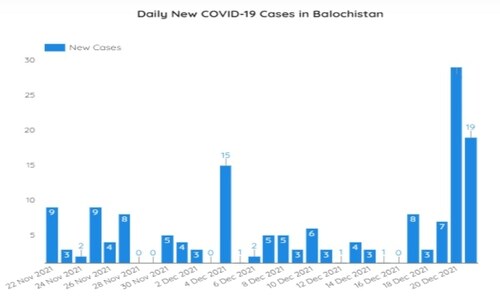ISLAMABAD: The government on Monday cautioned about the impending risks of Omicron on the economy including the concerns of the policymakers about the inflationary effects and the resulting policy response.
Omicron has forced economists across the globe to cast a shadow of doubt on the ongoing global economic growth recovery. Pakistan’s economy cannot ignore the impending risks of this spread, said Economic Adviser’s Wing (EAW) of the Ministry of Finance in its Monthly Economic Update & Outlook.
In its December Update, the EAW explained that Pakistan’s inflation rate is driven by the international commodity prices, exchange rate, seasonal factors and economic agents’ expectations concerning the future developments of these indicators.
The year-on-year increase in inflation in recent months is mainly driven by soaring electricity charges, fuel, house rent, transport and non-perishable food items among the largest contributors.
It is expected that the inflation will soften month-on-month in December. International oil prices have retreated somewhat from previous highs. The exchange rate continued to slightly depreciate but the government efforts to dampen the pass-through of high international food prices into domestic retail markets is continued.
However, the low base effect may contribute to keeping the December inflation rate in double-digit. Although the forecast probability margins are wide, most likely, year-on-year inflation is expected to remain double-digit in December but slightly less than the previous month’s number.
Global energy prices for November declined month-on-month by 6.4pc, while non-energy prices fell by 0.2pc.
The report noted that the fiscal deficit fell to 1.1pc of GDP in 4MFY22 from 1.7pc of a year ago. Similarly, the primary balance posted a surplus of Rs206bn in July-October compared to Rs156bn in the same period last year.
On the external side, the current account posted a deficit of 5.3pc of GDP ($7.1bn) in 5MFY22 against a 1.6pc ($1.9bn) surplus during the same months last year. The CAD widened due to the growing imports of energy and non-energy commodities, along with a rising trend in the global prices of oil, Covid-19 vaccines, food and metals.
According to the report, for rabi season 2021-22, the wheat crop has been cultivated on an area of 22.1 million acres (94.5pc of the target area of 23.3m acres). The input situation is expected to remain smooth to achieve the wheat production target of 28.9 million tonnes. The better input situation is expected to increase crops production in the rabi season.
Published in Dawn, December 28th, 2021















































